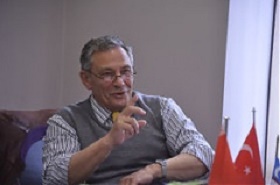Cooperation, Crisis, Demography, EU – Baltic States, Law and Regulations, Modern EU
International Internet Magazine. Baltic States news & analytics
Saturday, 27.04.2024, 00:32
Mediterranean states use structural reforms to reduce migration to Europe
 Print version
Print version |
|---|
At the 3rd Ministerial Conference on Employment
and Labour (Jordan, 27 September 2016), ministers of UfM member countries
reaffirmed their commitment to work together to address the challenges relating
to employment, employability and decent work.
Co-presidents of the UfM-meeting were Marianne Thyssen, Commissioner for Employment, Social Affairs, Skills and Labour Mobility, the Secretary General of the Union for the Mediterranean, Fathallah Sijilmassi and Jordan's Labour Minister, Ali AL-Ghezawi.
Commissioner Thyssen stated that in some countries on the Mediterranean shore, as much as half of the young people are out of a job: “We cannot allow this”.
She added that decent jobs and good opportunities in life are among the best measures to invest in future development: therefore, it is time to give a new impetus to UfM cooperation.
All sides need inclusive labour markets which provide equal chances to all people: women and men, the young and the old, university graduate and school dropouts.
Minister AL-Ghezawi emphasized that all the southern countries are facing issues of high unemployment mainly for females and youth. The way out are innovative ideas to spur economic growth as the most effective factor in creating jobs and mitigating the impact of the unemployment on socio-economic aspects taking into consideration the impact of the Syrian crisis on these countries. He added that urgent efforts should be made to find a better mechanism for skills matching, enhancing female economic participation and encouraging the formalization procedures.
Besides, the
Secretary General of the Union for the Mediterranean, Fathallah Sijilmassi,
underlined the urgency to enhance the
regional dimension and the collaborative approach to common cooperation efforts
to reinforce the human capital, which is the key for stability and security in
the region.
Therefore, he added “we need to place youth employability at the core of regional cooperation initiatives to make young people active players of the region’s socio-economic future.”
Pressing issues
The conference addressed the most pressing issues in the region: promoting job creation, improving youth employment and employability (including job matching and placement, strengthening public employment services), and promoting social dialogue. Moreover, the ministers discussed ways to contribute to growth, decent work and inclusion, for example by facilitating the transition from the informal to the formal economy and addressing challenges due to the refugee crisis.
Ministers at the Conference asserted the value of a common approach to address the issue of unemployment, particularly of young people and women, as a means to consolidate stability in the region. This regional effort towards job creation and decent work is crucial in the wider context of the recent commitments made by the United Nations and the International Labour Organisation (ILO) towards sustainable development and decent work as enshrined in the 2030 Agenda for Sustainable Development.
The ministers consulted with representatives of social
partners from both shores of the Mediterranean and underlined the importance of
tripartite and bipartite social dialogue. They welcomed the plan to organize
UfM Social Dialogue Forum in 2017/2018 and the financial support of €3 million
provided by the EU to the regional “Pilot project for the Promotion of Social
Dialogue in the Southern Mediterranean Neighbourhood”.
This project with a total budget of €3.75 million will be first implemented in Tunisia, Morocco and Jordan as priority countries and may possibly be expanded to other UfM partner countries. The social partners presented a common Declaration on Social Dialogue.
Structural and sustainable policy recommendations and reforms to promote job creation were also discussed: ministers strongly supported an integrated two-track approach, which addresses both the demand-side and the supply-side of the labour market. This means that measures in the form of macro-economic policies and private sector-led growth (demand), but also measures as vocational training and employability (supply), need to be taken simultaneously. The cross cutting priority is the transition from informal to formal employment, in order to guarantee the quality of jobs. To this end, the ministers encouraged national authorities to actively support the transition, in line with existing ILO efforts.
In conclusion, the UfM Secretariat emphasized that it was ready to support the outcomes of the Conference and make sure that political decisions translate in concrete projects to benefit young people. For example, the Mediterranean Initiative for Jobs (Med4Jobs), the flagship programme of the Secretariat launched in 2013 and developed with the support of the member countries, includes 12 projects under implementation in the Mediterranean region.
For more information see:
- Link to
Ministerial Declaration on Employment and Labour and
- Link to Declaration on Social Dialogue.
General reference: http://europa.eu/rapid/press-release_IP-16-3163_en.htm/ Press release, Brussels, 27 September 2016.








 «The Baltic Course» Is Sold and Stays in Business!
«The Baltic Course» Is Sold and Stays in Business!

